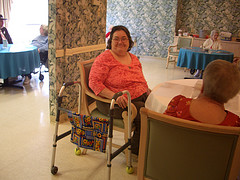It’s one of the issues many adults will eventually face – taking care of your parents as they get older. When your mom and dad become elderly, there are a number of medical needs you might have to consider. Even for those who are lucky enough to be healthy and happy well into their golden years, there will always be questions of costs and practicality – how do they grow old in the house where they live? Who will be there in case of an emergency? If you are faced with one or both parents suffering from serious medical problems that might include dementia or other forms of deterioration, the fears and questions you have may be overwhelming. Do I have to quit my job? Can I buy long term care insurance for my parent? How do I discuss power of attorney with them? More than anything, you want to be prepared.
1. Long-term Care Insurance
With the increase of aging in the population, private medical insurance for long-term care is on the rise. Many people need alternatives when they can’t qualify for Medicaid, and investing in a long-term care insurance plan for your parent can save you time and money and make sure that you don’t have to quit your job or spend all your resources – something that can foster resentments in adult children. This insurance is usually for people who can perform at least most of their daily activities on their own but suffer from mental or cognitive impairments. These insurance policies are usually guaranteed renewable for life, and they are also tax-deductible. They can cover both home care and nursing home facilities.
2. Home or Nursing Home?
Most people prefer to grow old in their own homes, but for many elderly, this just isn’t possible. Your parent’s mental or physical limitations might require them to need care around the clock and that can be difficult to provide. Plus, you may worry that your parent is unable to do the work involved in upkeep for their home. Then comes the agonizing decision of whether to let your parent move in with you or place them in a nursing home. It could be a truly positive experience to have your parent live with you – they get to spend time with your children and be involved with your family, which can be wonderful for their well-being. But there is always planning involved, especially in making sure your parent can get around easily and that there is adequate care for when you’re not around.
If you have small children or other serious responsibilities, you might be forced to make the tough decision to choose a nursing home. You want to make sure you look into different locations and compare before you make a decision, and that your parent is as involved as they can be. Cost and location may be the two biggest factors, which is why a strong insurance policy is vital.
3. Power of Attorney
The best possible time to discuss power of attorney is while your parent is still competent, which is why it is important to have the conversation with them sooner rather than later. A power of attorney manages finances and carries out financial decisions on behalf of the person in question. For medical decisions, you have to be appointed medical power of attorney or health proxy as well. It is important that your parent appoint someone with the best interests of them and their families in mind, and it is important they discuss and make clear what their wishes are if they were to become medically incapacitated. It can turn into a difficult situation if the power of attorney clashes with the rest of the family, so your parent can prepare for the future by making sure everyone is on the same page.
Caring for an aging parent can be a sad and stressful experience. It’s never easy to see the person who guided you for most of your life suffer from age and deterioration. But many adult children have a hugely positive experience where they strengthen their bonds with their parents as a result of careful planning, preparation, and weighing of all the options. It’s a feeling of great satisfaction to be able to say you took care of them nearly as well as they took care of you.
Amie Gottschalk is an avid blogger who writes often for insurance sites. You can follow her on Twitter @amiegottschalk.
Earnest Parenting: help for parents who are caring for their own parents.
Image courtesy of robinsan via Creative Commons license, some rights reserved.


